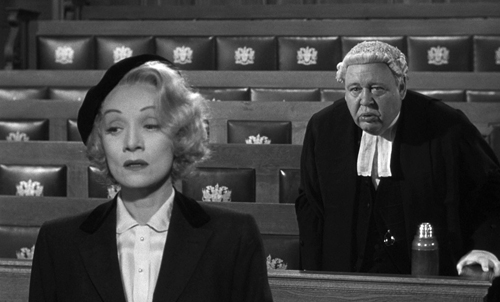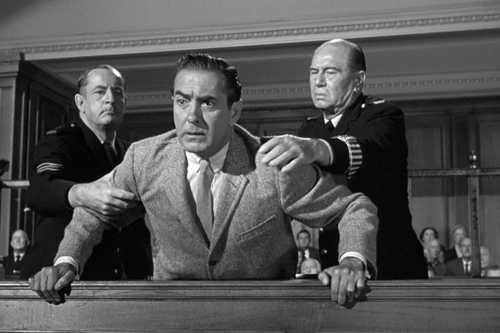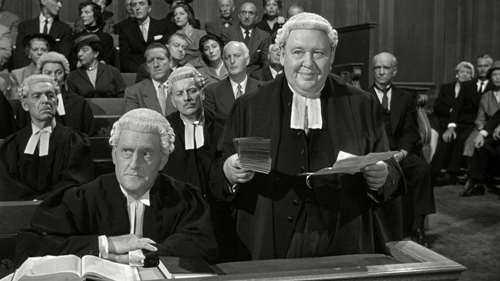
Your complimentary articles
You’ve read one of your four complimentary articles for this month.
You can read four articles free per month. To have complete access to the thousands of philosophy articles on this site, please
Films
Witness for the Prosecution
Matt Qvortrup sees Agatha Christie meet Aristotle in Billy Wilder’s classic.
From the golden era of Hollywood, this is a rare example of a film that merged the post-Second World War grittiness of English movies with a dose of Tinseltown glamour. Alfred Hitchcock said that many ‘believed that this epic’ was made by him. It wasn’t. But it could have been. Above all, and before we get to the philosophical points, I want to say that Witness for the Prosecution (1957) is a wonderful film: suspenseful, with surprising plot twists, and supreme action from stars from the silver screen, such as the incomparable Marlene Dietrich.
Based on a short story by none other than Agatha Christie, the film was actually directed by Polish-born American director Billy Wilder (whose real name was Shmuel Vilder). Wilder, a thrice Oscar Winner, became famous for such masterpieces as Double Indemnity, Sunset Boulevard, and Some Like It Hot. Christie herself said that she “considered it the finest film derived from one of her stories” (Los Angeles Times, 18th December 1957), which is saying something. After all, Sidney Lumet’s Murder on The Orient Express (1974), and John Guillermin’s Death on the Nile (1978) are rather good. But this film is different. Not least because the script (co-written by the director) was considerably more noir than many of Wilder’s other films, and certainly darker than Christie’s original story.
Wilder was anxious that spoilers should be avoided at all costs. He did not even allow the actors to view the final ten pages of the script until it was time to shoot those scenes. And, exceptionally, at the end of the cinema version, a voiceover asked that viewers “not divulge to anyone the secret of the ending of Witness for the Prosecution.” So there won’t be any spoilers here, either.
Wilder was a good student of ancient dramaturgy. “We need reversals, discoveries, and sufferings as well as intelligence and style” wrote Aristotle of the ideal tragedy (Poetics, 1459b). Here we get it in spades. Witness for the Prosecution is a classic court-room drama, with a twist. The story, at its most basic, concerns Leonard Vole, a suave, slightly naïve, none-too successful inventor (played by the unfairly forgotten Tyrone Power) who is accused of killing an elderly widow. The circumstantial evidence against him is overwhelming. He seeks the help of legal veteran Sir Wilfrid Robarts, QC (Charles Laughton) to save him. Alas, the portly lawyer is recovering from a heart attack while being nursed by Miss Plimsoll (Elsa Lanchester). In real life, Lanchester and Laughton were married, and their exchanges are inspired, funny, playful, and full of the chemistry that only exists between husband and wife. This spills over into the dialogue; for example:
Miss Plimsoll: Should I roll up the window?
Sir Wilfrid: Just roll up your mouth, you talk too much. If I had known how much you talk I’d never have come out of my coma.
For a long time, Sir Wilfrid refuses to take the case. “I have done an unethical thing. I have taken your cigar and I am not taking your case,” he says during this phase. Strictly speaking, this aspect of the plot is on shaky ground. Under the ‘cab-rank principle’ observed by London barristers, they cannot refuse to take the next case that comes up. But such small matters can be overlooked when you are willing to take on other cases, as Sir Wilfrid is. In any case, eventually, and in defiance of Miss Plimsoll’s medical advice, Sir Wilfrid takes the case, and we’re off.

Film images © United Artists 1957
We soon meet Mrs Vole, the defendant’s German-born wife (Marlene Dietrich), and the story takes the first unexpected turn of many. ‘Remarkable woman’ is how she’s described by Sir Wilfrid on more than one occasion. And so she is. She even plays more than one role – but to say more would be to give the game away. Suffice it to say, that this will not be immediately clear to you.
Certainly, this movie raises ethical and moral questions. Movies about murders always open up dilemmas of right and wrong, and this film is no exception. For example, are we right to lie for those whom we love? Or how far exactly are we allowed to go in pursuit of our goals? Should we be like Immanuel Kant, who believed that the important thing is to stay true to the imperatives of good behaviour; or should we instead strive for the greatest happiness of the greatest number, as a utilitarian like John Stuart Mill would have us believe? As a lawyer, it’s perhaps not surprising that Sir Wilfrid is driven by duty, even to the point of risking his fragile health. If we were to give him a label, he would perhaps be a Kantian deontologist (who says that what counts in ethics is duty rather than the consequences of actions). But attaching such an epithet to a larger-than-life character would miss the point.
“So,” I hear you ask, “what’s philosophical about this movie? Is it philosophical at all?” Aristotle (384-322 BCE) undoubtedly would have said so. He famously wrote, “Fiction is a more philosophical and a higher thing than history: for it tends to express the universal, history the particular” (Poetics, 1451b). What’s most remarkable about this drama is that it draws on a full spectrum of emotions. There’s laughter, but there is also a deep empathy with those who must make compromises and go against their innermost feelings to survive in a cruel and unforgiving world. In short, it’s full of the ‘universal’. So perhaps Witness for the Prosecution is best analysed through the lens of the often-neglected philosophical subdiscipline of aesthetics.

Aristotle’s Poetics lends itself to this like a well-fitted glove. The Macedonian philosopher also famously wrote that the main characteristic of good art was imitation (Greek mimesis) of the real world, and that plot (the Greek word was muthos) is key to achieving this in drama. In his own words, “The plot, then, is the first principle, and, as it were, the soul of a tragedy: Character holds the second place” (Poetics, 1450a). This film is also driven, not by one particular character, but by a unity of story that holds the narrative together. So this is a great film not just because of the barrister, the wife, the nurse, or even the accused, but because they all come together in a way that’s unexpected at all stages.
Aristotle further said that a tragedy is a whole, which “has a beginning, a middle, and an end… a well-constructed plot, therefore, must neither begin nor end haphazardly, but conform to these principles” (Poetics, 1450b). In modern film, this is very much the way.
The director Jean-Luc Goddard paraphrased Aristotle by observing that, “A film consists of a beginning, a middle, and an end, though not necessarily in that order.” In line with this addendum to Aristotle, Witness for the Prosecution is full of flashbacks, and the narrative in not linear. But all the same, the plot is clear and drives the story forward. Part of this is achieved through the dialogue – like this exchange: Someone says to Sir Wilfrid, “Touching isn’t it, the way he counts on his wife?” He responds, “Yes, like a drowning man clutching at a razor blade.” But just like the Classical plays analysed by the Macedonian master, Witness for the Prosecution is a masterclass in a well-crafted plot. And once again, the words of the ancient philosopher fit the bill. He wrote, “The unity of plot does not, as some persons think, consist in the unity of the hero. For infinitely various are the incidents in one man’s life, which cannot be reduced to unity” (Poetics, 1451a).

True to Aristotle’s prescription, the characters in Wilder’s film are conflicted and multifaceted. The barrister is a partly grumpy old man with none too sympathetic attitudes towards other people, and yet as the last line of the film will show, also someone with a deep sense of commitment to higher principles – rather like Aristotle’s description of one of Homer’s characters as “a good man and a paradigm of stubbornness” (Poetics, 1454a). This also fits Mrs Vole, who is capable of double-crossing deception, and yet is principled in a way that would appear contradictory, but which seems natural because the storyline is so captivating. Once more, Wilder achieves this effect by carefully following the line of Aristotle about being consistent: “even if the character described is someone inconsistent… [s]he should be consistently inconsistent” (Poetics 1454a). Again, this is largely achieved through the dialogue, which is intermixed with nuggets that did not appear in Christie’s original. Consider, for example, the social criticism contained in this short snippet:
Leonard Vole: But this is England, where I thought you never arrest, let alone convict, people for crimes they have not committed.
Sir Wilfrid: We try not to make a habit of it.
The essence of this film is that it showcases that good drama is storytelling, and that’s philosophical in itself. Film, as we might paraphrase Aristotle, is ‘representation of a superior kind’. And so Witness for the Prosecution, “performed by actors rather than told by a narrator, effects through pity and fear the purification of emotions” (Poetics, 1449b).
Aristotle would have approved this masterpiece. You will, too!
© Matt Qvortrup 2024
Matt Qvortrup is Professor of Political Science at Coventry University.









